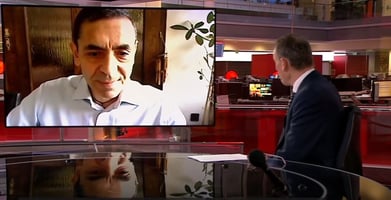It didn’t take long to get an early contender for the worst media interview of 2024.
If you’ve joined us for one of our media training courses, you’ll know we stress the importance of storytelling.
Telling good stories is an integral part of media interview success.
Good stories and anecdotes bring interviews to life and help spokespeople connect with the audience by humanising the content.
But to succeed, those stories must be relatable, as one interviewee found out the hard way this week.
Gordon Ramsay has been the centre of headlines and social media posts after telling the ‘least relatable story’ during an interview.
The celebrity chef appeared on the High Performance podcast, where he discussed the challenges he had overcome.
This included asking the father of his wife Tana for a loan so they could buy a flat.
“We were young. We were stupid. And we were skint,” he told host Jake Humphrey.
“I remember going to ask her father if I could borrow twenty grand for the deposit for a flat that we fell in love with.
“And I thought this was all going well, I’ll pay for lunch and said, ‘Oh by the way, about that deposit, Tana and I, we’ve got half, but we need the other twenty grand, I’ll pay you back in a year.
“He said, ‘Here’s what I’ll do, I’ll have another lunch with you when you sell your Porsche’.
“I thought, ‘You f****r, but you clever f****r’. Here I am driving around in a flash 911, and we didn’t even have a house, we didn’t have a flat, we didn’t have a roof over our heads.
“It was the best advice he ever gave me.”
Out on Monday…on the High Performance Podcast… pic.twitter.com/mjHkmAZGMq
— Jake Humphrey (@mrjakehumphrey) October 22, 2023
It is a personal story. And during our media training courses, we stress human and personal examples typically work best. People are drawn to stories about other people.
But this personal story is not relatable. Nor is it inspiring or motivational.
Not many of those listening will have a sports car to sell when times get tough or a father-in-law who can lend £20,000.
And can you describe yourself as being “skint” while admitting you have £20,000 saved up in the same story?
It’s hardly a rags-to-riches anecdote. Or an inspirational tale of triumph coming from adversity.
It is hard to imagine it resonating with an audience struggling with a cost-of-living crisis.
Struggling to buy a house? Finding it hard to put food on the table? Just sell your Porsche.
Here are some of the headlines the story created as it was picked up by traditional media.
And here are some of the mocking social media posts that grabbed our attention as the internet reacted to the anecdote:
During the podcast appearance, the high-profile chef also spoke about his tough childhood, having free school meals and living on “Lucozade and Mars bars” as a young chef.
But the Porsche tale is so unrelatable that it snatched attention away from these anecdotes.
There is an argument Mr Humphrey didn’t help the chef by using this story to promote the podcast on social media rather than some anecdotes that may have better resonated.
But once you’ve said it, you can’t control how an anecdote is used.
So, what can your spokespeople learn from this? And what makes a good story for media interviews?
Don’t let it put you off
Storytelling matters.
Stories make messages memorable and help build connections.
They can spark curiosity and create a sense of honesty and openness. People want to hear about failures, disappointments and successes.
And they talk to our hearts, as well as our minds, evoking emotions.
Relevant
Stories must be relevant and relatable to do that.
Think about your audience – will people be able to see themselves in what you are saying? Will it strike a chord with them? Is it something they care about? Will they see the story the same way?
Or will it make you seem out of touch and distract from what you want to say?
And the story must be relevant to the message you want to get across in the interview.
Length
If your spokesperson appears on radio or TV, they will need to keep their stories concise.
Time is in short supply. It is a bit of a balancing act because you need to be careful not to remove the colour, so tread carefully.
Podcast interviews give more freedom to go into detail. But it is not the place for a rambling tale.
People will switch off or zone out if a story becomes hard to follow.
Conversational
Keep the language conversational.
Opt for stories with natural, conversational language and avoid jargon and technical language that is likely to confuse your audience.
Paint pictures with your words.
Self-edit
This is something we’ve spoken about in our media training blogs before.
Good spokespeople monitor and choose their words and stories carefully because they are sensitive to the impact they have on others.
They are attuned to their audience, are aware of boundaries, and know what will motivate people to take positive action and what will cause them to switch off.
Avoid the ‘S-word’
While Gordon Ramsey seems to be a big fan of the F-word, it is the S-word that can often impact stories.
Spokespeople tend to introduce stories with something like, “I’ve got a great example/story about that”.
And it makes them sound rehearsed and scripted.
Instead, they should go straight into their stories like they would if they were talking to friends.
Practice
Spokespeople should practice their stories ahead of interviews.
Do they support the message in the way they think? Are they confusing? Could it cause a distraction?
Encourage them to practice their stories with the comms team. Or friends and colleagues if they will give honest feedback.
Bank
Spokespeople should look to build a bank of stories they could use in media interviews.
Different stories will be relevant for different messages.
So, having a bank of stories available that you can pull from can help reduce interview preparation time.
This interview is also a reminder of the growing significance and impact of podcasts.
The High Performance podcast went past 50m downloads earlier this year. It attracts high-profile guests and has a full-time team working on it.
And, what is said on it, just like with other podcasts, can be picked up by other media and travel further and wider.
As with other media interviews, good preparation is the key ingredient in podcast appearance success.
Media First are media and communications training specialists with over 35 years of experience. We have a team of trainers, each with decades of experience working as journalists, presenters, communications coaches and media trainers.
Click here to find out more about our media training and our podcast production services.
Subscribe here to be among the first to receive our blogs.




